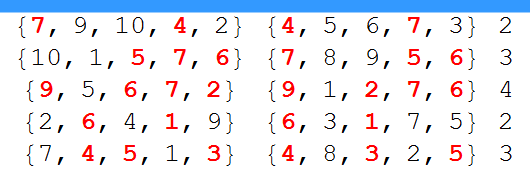I have 2 Lists. The first one includes all the numbers from 1 to 10.
listA={1,2,3,4,5,6,7,8,9,10}
The second includes random numbers, like this:
listB={2,10,2,5,7,15,1000,7,25,600}
I want to find an algorithm that will take any number of the second list listB and compare it to all numbers in listA. If the number in listB is equal to a number in listA, I"ll get 1 as a result. If not it will be 0. As a final result I would like to sum all equal numbers.
Here, for example we have the result 6 because we can find 2 (twice), 7 (twice), 5 and 10 in the two lists. I need a general way because my lists includes data of 10,000 numbers.



Total @ Table[Count[l2, l1[[i]]], {i, 1, Length@l2}]$\endgroup$